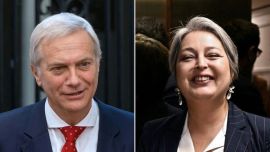Consumer prices in Argentina rose 2.5 percent in November, one of the lowest monthly figures of the year along with August, the INDEC national statistics bureau revealed on Tuesday.
Despite the deceleration from last month’s figure of 3.5 percent, prices have nevertheless increased 45.4 percent since January and by 51.2 percent over the last 12 months, according to government data.
In the words of Commerce Secretary Roberto Feletti, the news was “a success,” given that inflation had slowed to below three percent, the figure forecast by a majority of analysts.
The biggest increases last month were observed in restaurants and hotels (up five percent) and clothing (4.1 percent). The latter in particular drew the eye – prices have risen 62.8 percent over the past 12 months.
Food and beverages registered a rise of 2.1 percent, posting an annual increase of 50.5 percent. The fiercest hikes were seen in fruits (4.4 percent), meat (three percent) and bread (2.5 percent).
Adding to the pressure it has already exerted on meat producers, Feletti announced a new “agreement” with the sector to tamp down prices on five cuts used in asado barbeques for holiday season.
President Alberto Fernández’s government said this week that controlling inflation is one of the key points for both sides in negotiations with the International Monetary Fund (IMF) to restructure the country’s debt of US$44 billion.
Speaking before Congress on Monday, Economy Minister Martín Guzmán confirmed that government price controls on staple items would be extended into 2022. Freezes were imposed this year on around 1,400 products after talks with producers.
Guzmán told lawmakers that lowering inflation is one of the government’s “central objectives” while recognising that prices had increased beyond his forecasts in last year’s budget. Batting back criticism from the opposition, the minister said that Argentina’s problem with “inflation is multi-causal.”
According to the Central Bank's latest survey of expectations, based on reports from 42 of the country’s largest banks, consultancy firms and research centres, projects an inflation rate of 51.1 percent for 2021.
Argentina’s economy is slowly emerging from a deep recession that first took hold in 2018, prompting a financial crisis that culminated in then-president Mauricio Macri agreeing a record US$57-billion credit-line with the IMF.
President Fernández halted delivery of the loan’s remaining tranches in December 2019 after his election victory over Macri.
Guzmán said earlier this week that data indicates that gross domestic product will increase by 10 percent in 2021, bouncing back after a 9.9 percent slump last year amid the coronavirus pandemic.
– TIMES/AFP/NA























Comments